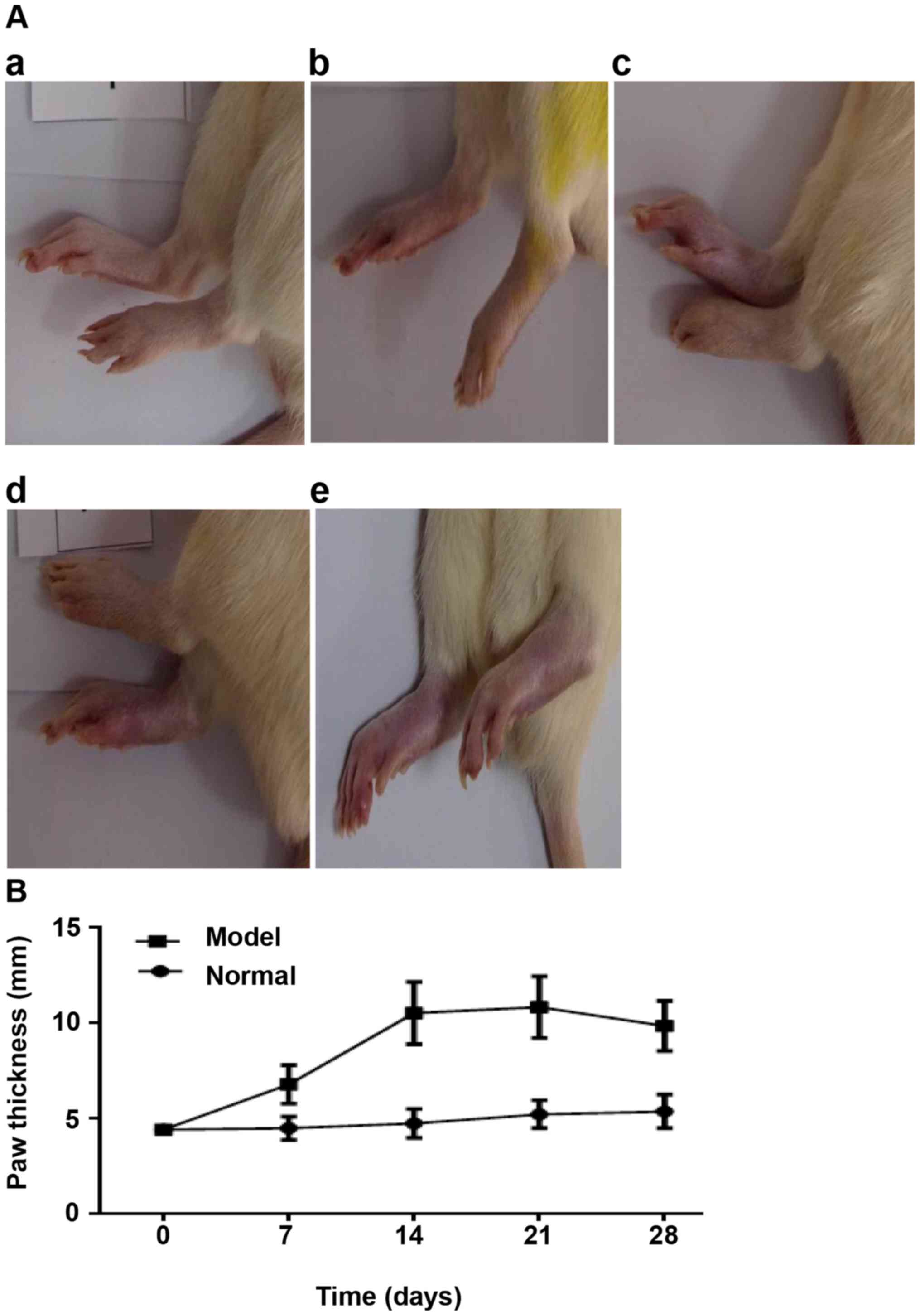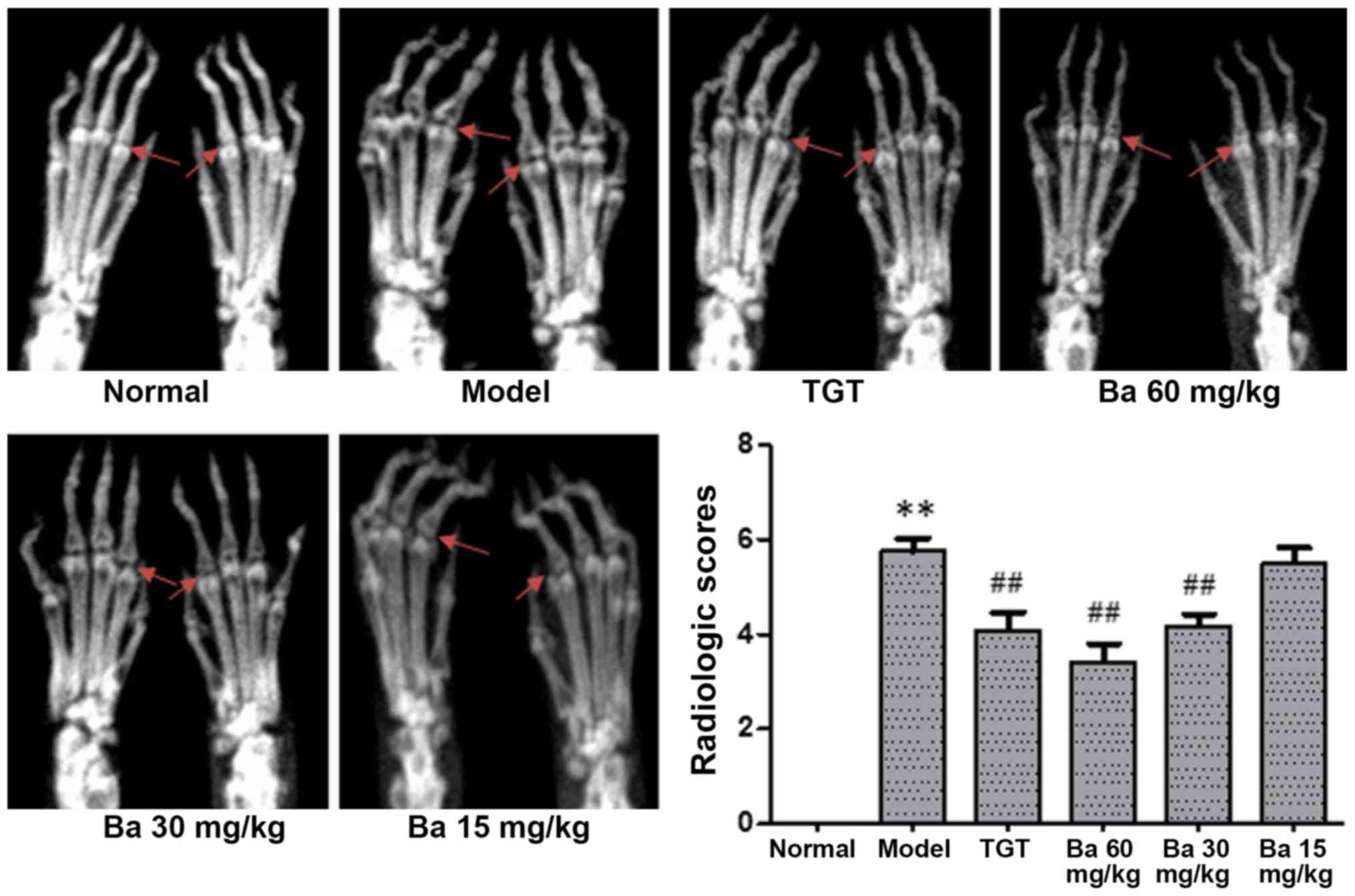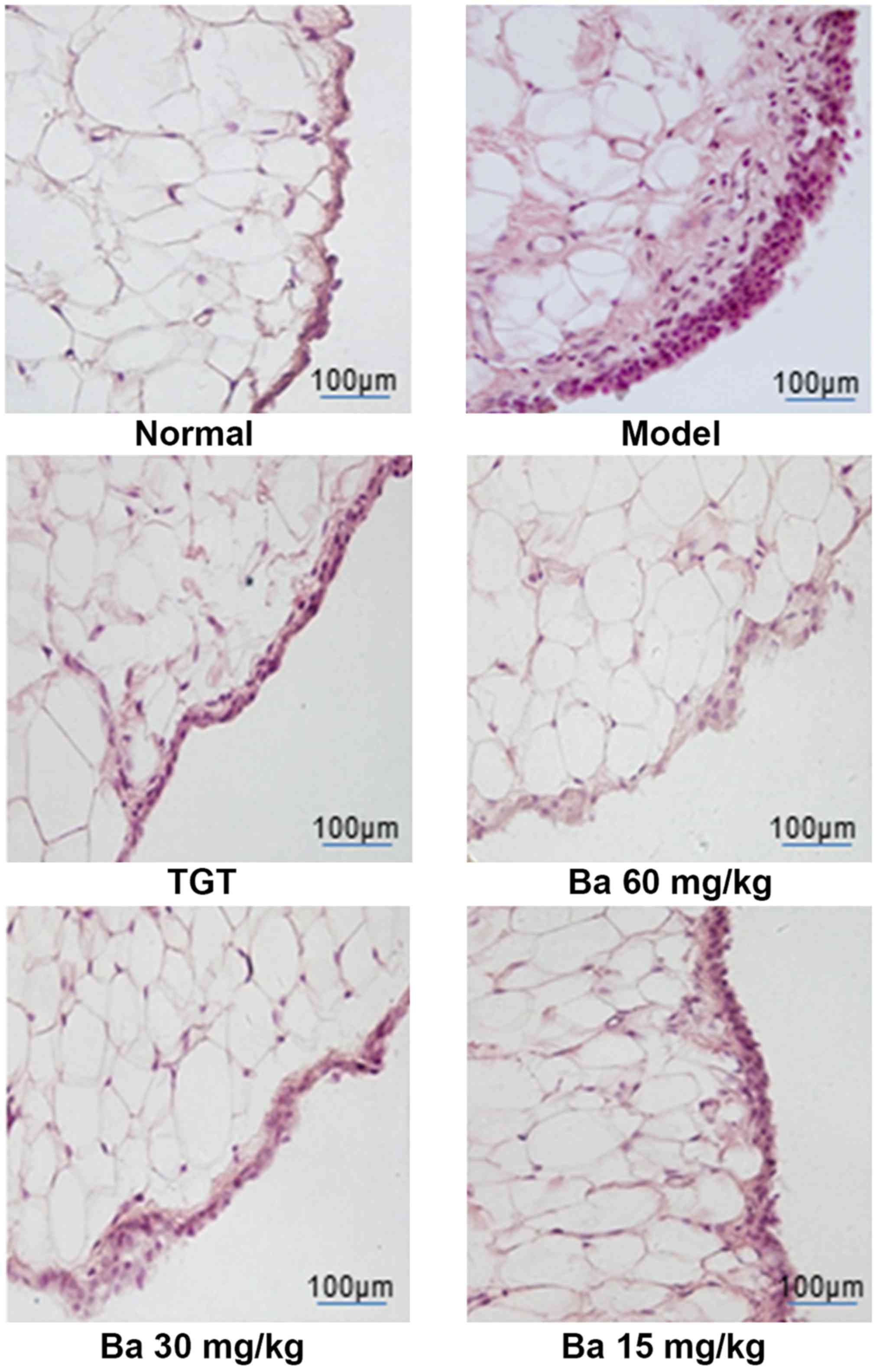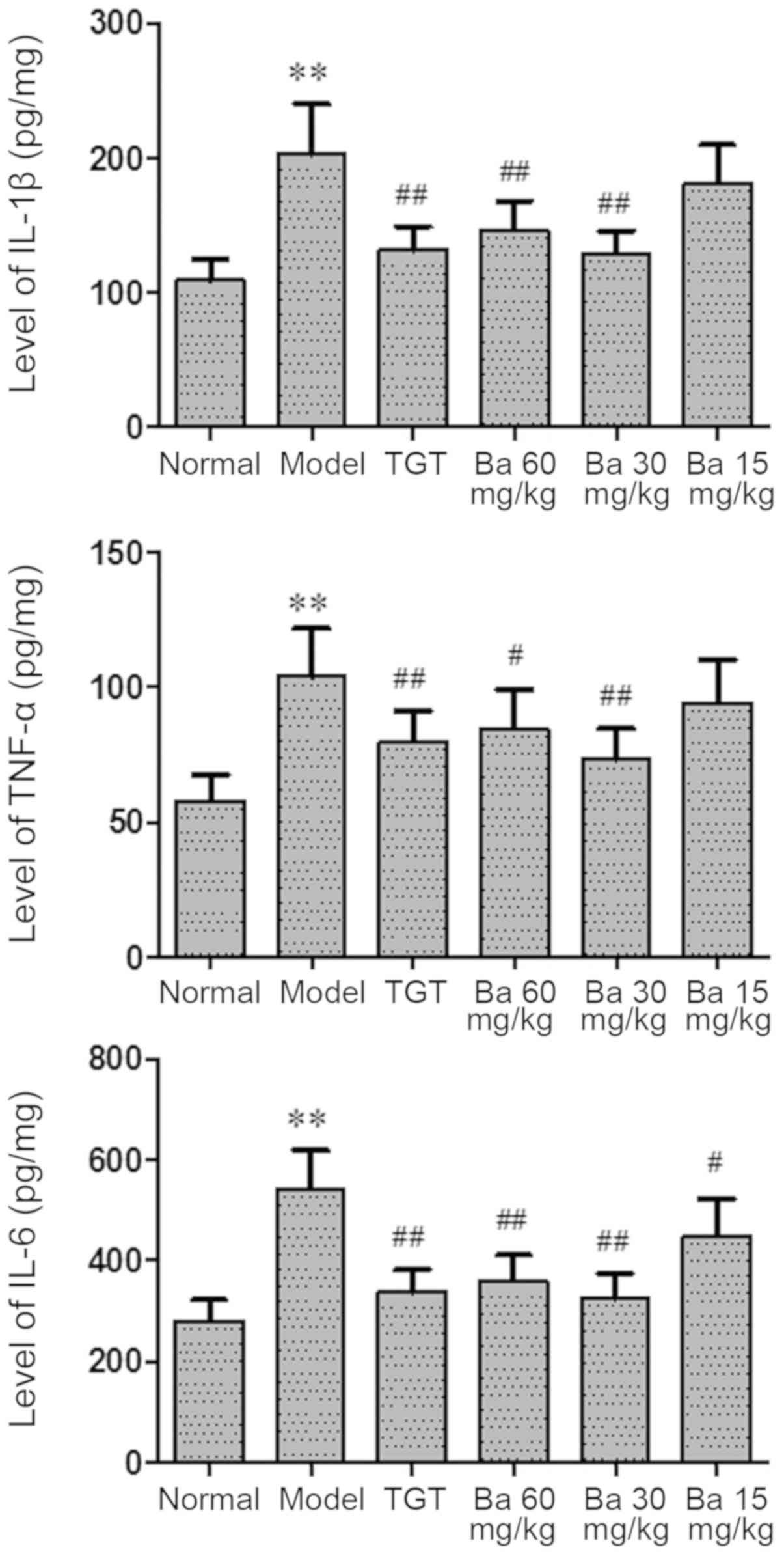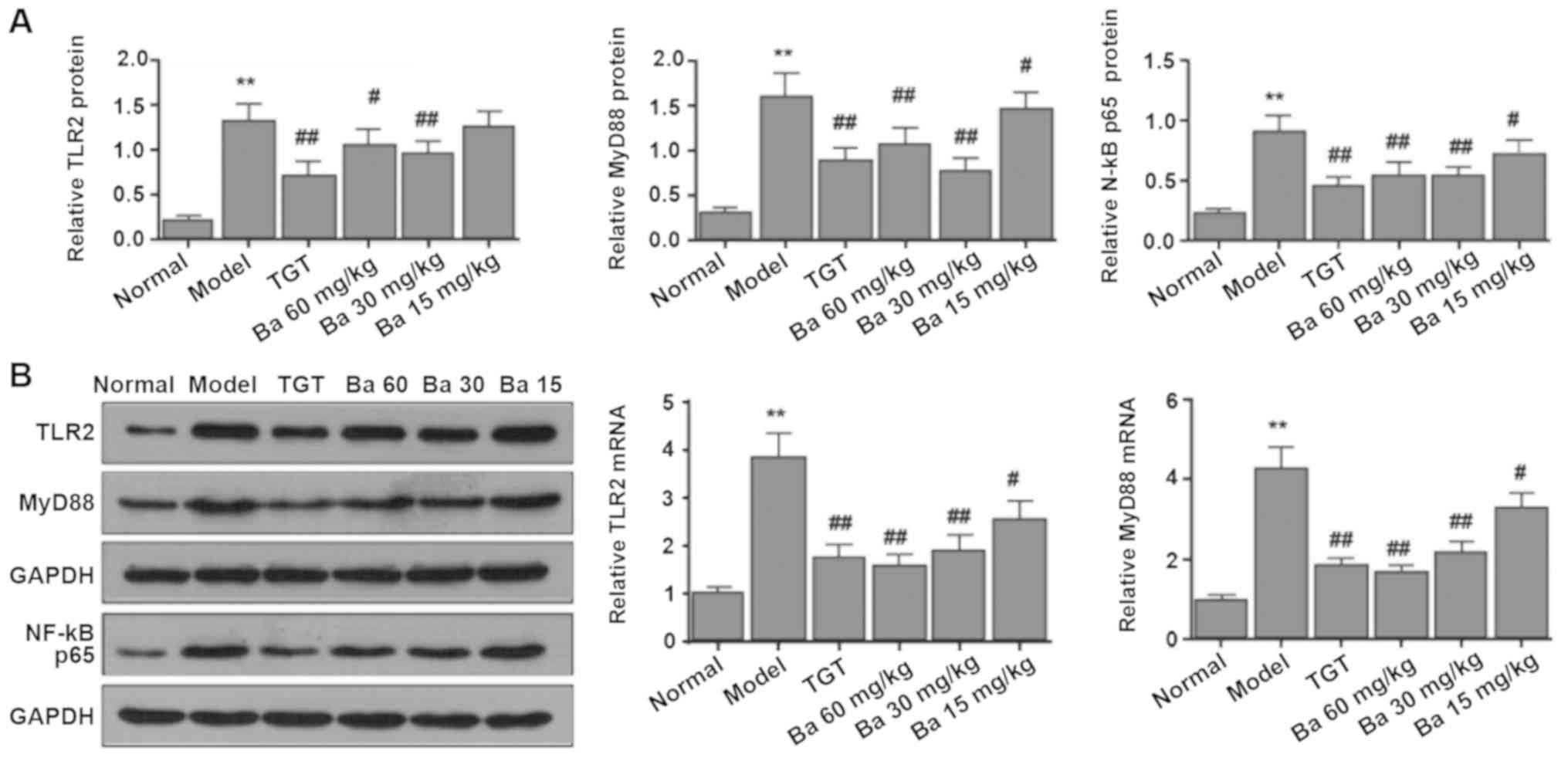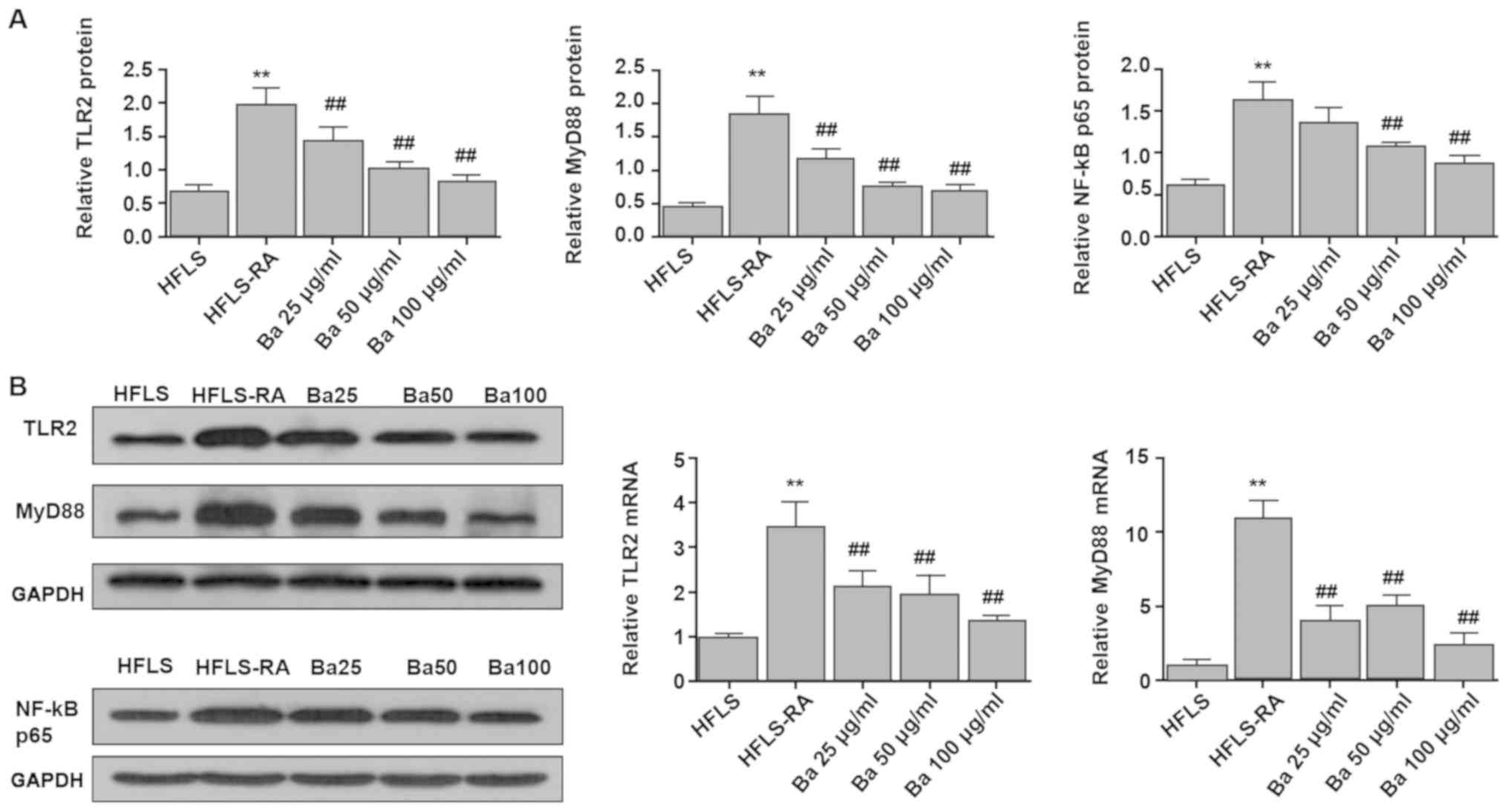|
1
|
Mclnnes IB and Schett G: The pathogenesis
of rheumatoid arthritis. N Engl J Med. 365:2833–2219. 2011.
|
|
2
|
van den Hoek J, Boshuizen HC, Roorda LD,
Tijhuis GJ, Nurmohamed MT, van den Bos GA and Dekker J: Mortality
in patients with rheumatoid arthritis: A 15-year prospective cohort
study. Rheumatol Int. 37:487–493. 2017. View Article : Google Scholar : PubMed/NCBI
|
|
3
|
Bartok B and Firestein GS: Fibroblast-like
synoviocytes: Key effector cells in rheumatoid arthritis. Immunol
Rev. 233:233–255. 2010. View Article : Google Scholar : PubMed/NCBI
|
|
4
|
Guo Q, Wang Y, Xu D, Nossent J, Pavlos NJ
and Xu J: Rheumatoid arthritis: Pathological mechanisms and modern
pharmacologic therapies. Bone Res. 6:152018. View Article : Google Scholar : PubMed/NCBI
|
|
5
|
Branimir A and Miroslav M: Pathogenesis of
rheumatoid arthritis. Reumatizam. 61:19–23. 2014.(In Croatian).
PubMed/NCBI
|
|
6
|
Araki Y and Mimura T: The Mechanisms
underlying chronic inflammation in rheumatoid arthritis from the
perspective of the epigenetic landscape. J Immunol Res.
2016:62906822016. View Article : Google Scholar : PubMed/NCBI
|
|
7
|
Wilsdon TD and Hill CL: Managing the drug
treatment of rheumatoid arthritis. Aust Prescr. 40:51–58. 2017.
View Article : Google Scholar : PubMed/NCBI
|
|
8
|
Akira S, Uematsu S and Takeuchi O:
Pathogen recognition and innate immunity. Cell. 124:783–801. 2006.
View Article : Google Scholar : PubMed/NCBI
|
|
9
|
Huang QQ and Pope RM: The role of
toll-like receptors in rheumatoid arthritis. Curr Rheumatol Rep.
11:357–364. 2009. View Article : Google Scholar : PubMed/NCBI
|
|
10
|
Jimenez-Dalmaroni MJ, Gerswhin ME and
Adamopoulos IE: The critical role of toll-like receptors-from
microbial recognition to autoimmunity: A comprehensive review.
Autoimmun Rev. 15:1–8. 2016. View Article : Google Scholar : PubMed/NCBI
|
|
11
|
Huang QQ and Pope RM: The role of
glycoprotein 96 in the persistent inflammation of rheumatoid
arthritis. Arch Biochem Biophys. 530:1–6. 2013. View Article : Google Scholar : PubMed/NCBI
|
|
12
|
Sampaio NG, Kocan M, Schofield L, Pfleger
KDG and Eriksson EM: Investigation of interactions between TLR2,
MyD88 and TIRAP by bioluminescence resonance energy transfer is
hampered by artefacts of protein overexpression. PLoS One.
13:e02024082018. View Article : Google Scholar : PubMed/NCBI
|
|
13
|
Iwahashi M, Yamamura M, Aita T, Okamoto A,
Ueno A, Ogawa N, Akashi S, Miyake K, Godowski PJ and Makino H:
Expression of Toll-like receptor 2 on CD16+ blood monocytes and
synovial tissue macrophages in rheumatoid arthritis. Arthritis
Rheum. 50:1457–1467. 2004. View Article : Google Scholar : PubMed/NCBI
|
|
14
|
McGarry T, Veale DJ, Gao W, Orr C, Fearon
U and Connolly M: Toll-like receptor 2 (TLR2) induces migration and
invasive mechanisms in rheumatoid arthritis. Arthritis Res Ther.
17:1532015. View Article : Google Scholar : PubMed/NCBI
|
|
15
|
Li BQ, Fu T, Gong WH, Dunlop N, Kung H,
Yan Y, Kang J and Wang JM: The flavonoid baicalin exhibits
anti-inflammatory activity by binding to chemokines.
Immunopharmacology. 49:295–306. 2000. View Article : Google Scholar : PubMed/NCBI
|
|
16
|
Hou J, Wang J, Zhang P, Li D, Zhang C,
Zhao H, Fu J, Wang B and Liu J: Baicalin attenuates proinflammatory
cytokine production in oxygen-glucose deprived challenged rat
microglial cells by inhibiting TLR4 signaling pathway. Int
Immunopharmacol. 14:749–757. 2012. View Article : Google Scholar : PubMed/NCBI
|
|
17
|
Xu XF, Cai BL, Guan SM, Li Y, Wu JZ, Wang
Y and Liu B: Baicalin induces human mucoepidermoid carcinoma Mc3
cells apoptosis in vitro and in vivo. Invest New Drugs. 29:637–645.
2011. View Article : Google Scholar : PubMed/NCBI
|
|
18
|
Yin F, Liu J, Ji X, Wang Y, Zidichouski J
and Zhang J: Baicalin prevents the production of hydrogen peroxide
and oxidative stress induced by Abeta aggregation in SH-SY5Y cells.
Neurosci Lett. 492:76–79. 2011. View Article : Google Scholar : PubMed/NCBI
|
|
19
|
Sun F and Gu W: Baicalin attenuates
collagen-induced arthritis via inhibition of JAK2-STAT3 signaling
and regulation of Th17 cells in mice. J Cell Commun Signal.
13:65–73. 2019. View Article : Google Scholar : PubMed/NCBI
|
|
20
|
Wang HZ, Wang HH, Huang SS, Zhao H, Cao
YG, Wang GZ, Wang D, Wang ZG and Liu YH: Inhibitory effect of
baicalin on collagen-induced arthritis in rats through the nuclear
factor-κB pathway. J Pharmacol Exp Ther. 350:435–443. 2014.
View Article : Google Scholar : PubMed/NCBI
|
|
21
|
Ye L, Tao Y, Wang Y, Feng T and Li H: The
effects of baicalin on the TLR2/4 signaling pathway in the
peripheral blood mononuclear cells of a lipopolysaccharide-induced
rat fever model. Int Immunopharmacol. 25:106–111. 2015. View Article : Google Scholar : PubMed/NCBI
|
|
22
|
Sun JY, Li DL, Dong Y, Zhu CH, Liu J, Li
JD, Zhou T, Gou JZ, Li A and Zang WJ: Baicalin inhibits toll-like
receptor 2/4 expression and downstream signaling in rat
experimental periodontitis. Int Immunopharmacol. 36:86–93. 2016.
View Article : Google Scholar : PubMed/NCBI
|
|
23
|
Liu W, Sun Y, Cheng Z, Guo Y, Liu P and
Wen Y: Crocin exerts anti-inflammatory and anti-arthritic effects
on type II collagen-induced arthritis in rats. Pharm Biol.
56:209–216. 2018. View Article : Google Scholar : PubMed/NCBI
|
|
24
|
Lin ZP, Lin HL, Yu XP, Zheng YJ and Cheng
SY: TLR4 mediates inflammation and hepatic fibrosis induced by
chronic intermittent hypoxia in rats. Mol Med Rep. 22:651–660.
2020. View Article : Google Scholar : PubMed/NCBI
|
|
25
|
Cai X, Zhou H, Wong YF, Xie Y, Liu ZQ,
Jiang ZH, Bian ZX, Xu HX and Liu L: Suppression of the onset and
progression of collagen-induced arthritis in rats by QFGJS, a
preparation from an anti-arthritic Chinese herbal formula. J
Ethnopharmacol. 110:39–48. 2007. View Article : Google Scholar : PubMed/NCBI
|
|
26
|
Livak KJ and Schmittgen TD: Analysis of
relative gene expression data using real-time quantitative PCR and
the 2(-Delta Delta C(T)) method. Methods. 25:402–408. 2001.
View Article : Google Scholar : PubMed/NCBI
|
|
27
|
Elshabrawy HA, Essani AE, Szekanecz Z, Fox
DA and Shahrara S: TLRs, future potential therapeutic targets for
RA. Autoimmun Rev. 16:103–113. 2017. View Article : Google Scholar : PubMed/NCBI
|
|
28
|
Haag S, Tuncel J, Thordardottir S, Mason
DE, Yau AC, Dobritzsch D, Backlund J, Peters EC and Holmdahl R:
Positional identification of RT1-B (HLA-DQ) as susceptibility locus
for autoimmune arthritis. J Immunol. 194:2539–2550. 2015.
View Article : Google Scholar : PubMed/NCBI
|
|
29
|
Jutley G, Raza K and Buckley CD: New
pathogenic insights into rheumatoid arthritis. Curr Opin Rheumatol.
27:249–255. 2015. View Article : Google Scholar : PubMed/NCBI
|
|
30
|
Mc Ardle A, Flatley B, Pennington SR and
FitzGerald O: Early biomarkers of joint damage in rheumatoid and
psoriatic arthritis. Arthritis Res Ther. 17:1412015. View Article : Google Scholar : PubMed/NCBI
|
|
31
|
Mateen S, Shahzad S, Ahmad S, Naeem SS,
Khalid S, Akhtar K, Rizvi W and Moin S: Cinnamaldehyde and eugenol
attenuates collagen induced arthritis via reduction of free
radicals and pro-inflammatory cytokines. Phytomedicine. 53:70–78.
2019. View Article : Google Scholar : PubMed/NCBI
|
|
32
|
Alam J, Jantan I, Kumolosasi E, Nafiah MA
and Mesaik MA: Suppressive effects of the standardized extract of
phyllanthus amarus on type ii collagen-induced rheumatoid arthritis
in sprague dawley rats. Curr Pharm Biotechnol. 19:1156–1169. 2018.
View Article : Google Scholar : PubMed/NCBI
|
|
33
|
Zhang Y, Li X, Ciric B, Ma CG, Gran B,
Rostami A and Zhang GX: Therapeutic effect of baicalin on
experimental autoimmune encephalomyelitis is mediated by SOCS3
regulatory pathway. Sci Rep. 5:174072015. View Article : Google Scholar : PubMed/NCBI
|















